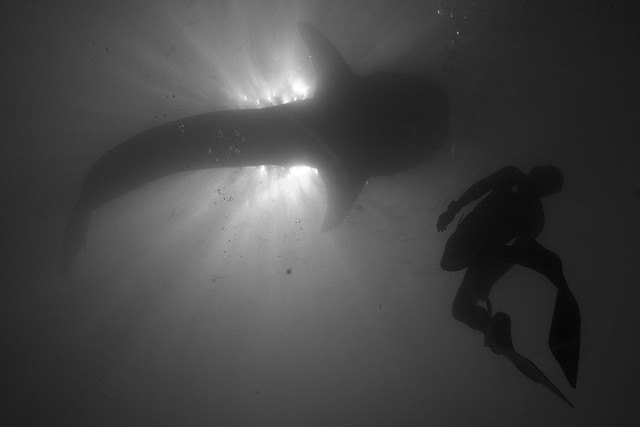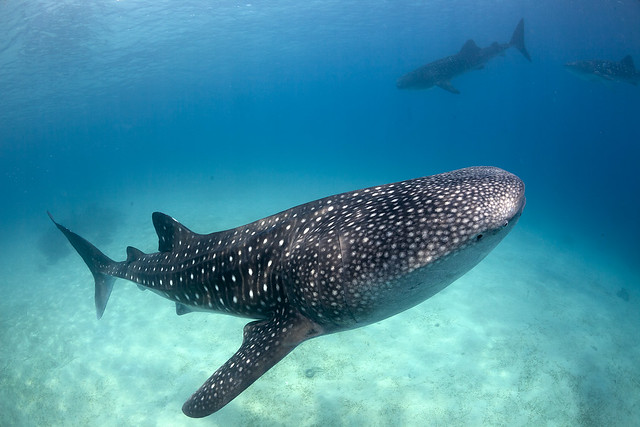4 Reasons Why You should not believe 4 Reasons not to visit the Whale Sharks in Oslob
1. Recently quite a few blog posts and articles kept popping up which warned folks that there are 5 (or 4, or 3) reasons not to swim with the whale sharks in Oslob. A micro bit of background: In Oslob whale sharks are fed and lured into the bay for tourists to swim and dive with them. The whale sharks used to visit Oslob before the feeding, but now they show up more reliably and year-round. They are not in an enclosure as has been erroneously claimed, and they leave they bay in the afternoon after the feeding stops for the day.
2. I have the impression that quite a few of the people who are full of outrage about the whale shark tourism in Oslob have rather little knowledge of marine biology and conservation science. Being a “travel blogger” does not qualify you to write about shark biology and conservation, in my opinion. Unsurprisingly, a lot of the “arguments” opposed to seeing the whale sharks in Oslob are simply false (“the sharks are in an enclosure”), and very often anthropomorphic (falsely implying that the sharks are more or less humans with fins and should be treated like that). Some bloggers think that they know what the sharks are thinking (“The sharks now think that boats are always a source of food”). Speculation is often presented as established facts.
I have spent the last 15 years and 3000-plus dives watching fishes. Still, I certainly don’t know what a shark or any other fish thinks. When I want to find out about the effects of shark feeding, I read the scientific literature. But, that’s just me. I guess for others it feels good to be morally outraged. And it can get you attention, and clicks online!
3. There is only sparse scientific evidence that provisioning sharks affects them negatively. As far as I know, there is no known case where feeding led to “the sharks forgetting how to feed for themselves” and “shark behavior being altered so that they do not reproduce”. In fact, provisioned lemon sharks in Fiji leave the feeding sites during mating season. The long range migration patterns of provisioned tiger sharks in the Caribbean are not altered at all… That all does not suggest that shark feeding is an overly detrimental activity for sharks. Is it possible that the feeding has negative effects? Yes! But it’s not proven, and the possible detrimental effects should be weighed against the positive effect that the sharks are not caught & eaten anymore, since they now represent a source of income when alive to the former fishermen in Oslob/Cebu!
There are quite a few shark and ray feeding locations in the world. Another example is the “Manta Night Dive” event in Kona, Hawaii. There, strong lights placed in the sand underwater in a shallow bay attract plankton, and the plankton attracts giant manta rays, up to 20 of them on good nights. It’s really awesome. I have done it twice.
Is this “natural”? It certainly wouldn’t happen without the lights placed there by the dive shops. Do the rays “think the presence of humans means food” now? Again, I don’t know what rays think.
Why isn’t the “Manta Night Dive” the target of so much outrage? My guess is because it’s well marketed by media-savvy American dive shops, and not run by Filipino villagers with less media expertise.
Some more information about this issue is here.
4. Fourth reason why you should not believe 4 reasons not to visit the whale sharks in Oslob: Anyone who writes blog posts in lists (other than me, who just does it to make fun of lists!!!) is a lousy writer incapable of assembling a narrative flow and should stop blogging anyway.
PS: I used to work for two dive shops which offered trips to Oslob, but I don’t anymore. I have nothing to gain from the whale shark feeding over there. I simply would like to see a fact-based, and not an emotion-based, discussion of the issue!
Edit October 2016 – I work for a dive shop again which takes its guests to Oslob – I don;t think that changes the validity of the arguments here!
Dr. Klaus M. Stiefel is a zoologist and PADI Scuba diving instructor (Staff Instructor and Tec Deep Instructor) as well as a PADI Project AWARE shark conservation instructor.





